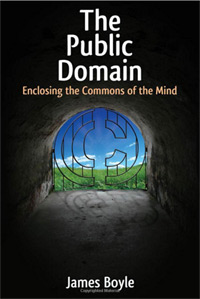Techdirt.com has grown from a one-man operation founded by Mike Masnick in 1997 to become one of the web’s leading collaborative voices in analysis of issues relating to technology, economics, law and entertainment. The site has amassed 850,000+ RSS subscribers, 35,000+ posts, 250,000+ comments and a consistent rating within Technorati’s top 100.
I interviewed Mike on behalf of the One Movement Word blog, where I focussed on questions relating to the music industry. Our unedited conversation is below.

Andrew: What inspires you to write about the latest in digital content?
Mike: I actually think it’s a really important issue, that is, in many ways, an “early warning sign” of some economic changes that are going to impact many other industries, from healthcare to energy to consumer packaged goods to financial services. It’s just that digital content lays out the specifics much more clearly (and yet it’s still confusing to some people!). I’m hopeful that as people start to understand these issues, when the “bigger” similar issues come to the forefront, it will be easier to point back to what happened with digital content to make it clear how things should play out elsewhere.
How do you keep Techdirt fresh with new topics each day? I imagine that you draw from a massive pile of sources.
Yes, I definitely read a lot via RSS and (more and more) via Twitter. When I see something that strikes me as interesting, I write it up. We also get a fair number of submissions through the site’s submission page, which often alerts me to interesting stories I would not have seen elsewhere. These days, there’s always more content than I have time to write up.
Which are the sites you check first when you wake up in the morning?
I have to admit that I like to switch it up pretty regularly, so that I don’t get into a rut and find myself too focused on any particular source. That said, to get a sense of what’s going on, in general, in the tech world, I probably check News.com, Wired.com, Slashdot, Broadband Reports and Techmeme most frequently.
You tend to decide your stance on an issue and argue passionately , as evidenced by the ‘from the (x) dept‘ lines under each article. How long did it take for you to hone this instinct to see issues in such an assured manner?
Well, I’ve always looked at the blog as a part of a conversation, where I expect some discussion to take place — so I don’t necessarily think that I take a totally “assured” position on many things. Often I’m actually looking to see what discussion occurs in the comments, and from there my position becomes more clear as I discuss it.
But, because of that, I do think the posts themselves have become more and more assured over the years, in part because of the earlier discussions I’ve had in the comments, where people maybe challenged this or that aspect of something, and it forced me to dig deeper and to better understand an issue to the point that I was pretty sure that where I was going with it was accurate.
I learned, a long time ago when I taught university statistics that I ended up learning statistics much, much better once I started teaching it than when I was taking all those course and passing tests. That’s because when I was teaching it, students would ask “why” or wouldn’t understand the basic explanation I would give them. So I would need to really, really understand it myself, so I could better explain it to the students.
I think the same thing is true with the blog. I definitely understood the economic framework when I started writing the blog, but when the discussions started and people started asking questions that I really was forced to understand the economics at play at a much, much deeper level, so that I could explain my positions back to people in a way (hopefully!) that they would understand.
But, of course it’s always a learning process, and I’m always learning more. And it’s in those discussions that I learn, and I hope that the next post I’m slightly smarter for it. I think that will always occur. And it’s great. I love continually learning new stuff.
From what I gather, Techdirt began as a source of customised news for tech companies. How has this role evolved since 2000?
It’s certainly evolved quite a bit. We did customized news and analysis for many companies for a while (and we still have a few “legacy” customers in that space), but we’ve definitely moved on to focusing on the Insight Community as our business model, which was a quite reasonable evolution. Basically, as we were doing analysis for various companies, we often would realize that our internal team might not have as much insight or expertise on a particular story as the large readership on Techdirt. So we started to reach out to the folks in our community… and then evolved that into a formalized process called The Insight Community, to let companies tap into our wider community, rather than just our internal team.
A second, more recent evolution, is the realization that the Insight Community isn’t just a great tool for internal research and analysis, but for marketing purposes as well. So these days, a growing percentage of the use of the Insight Community is to host public conversations that help market a company, allowing them to talk about issues with our community in a public way. It allows those companies to help build their brand and at the same time get insight back. On top of that, we allow companies to then repurpose that content, so many of them use the content developed by the Insight Community to help create their own blogs/whitepapers written by third party content. It’s really a win-win-win situation for everyone involved.
Seth Godin [pictured right] has been a vocal critic of tertiary education for business students. What are your thoughts on the value of business school in the modern economy?
 I think it really depends on what you want to do. You get out of it what you need to. For certain jobs, it’s still quite necessary. I didn’t go the standard MBA route, but I did get a ton out of my experience, with two key points:
I think it really depends on what you want to do. You get out of it what you need to. For certain jobs, it’s still quite necessary. I didn’t go the standard MBA route, but I did get a ton out of my experience, with two key points:
- I learned a lot more from my professors directly than I expected to. The “book learning” wasn’t a very big deal. But we had a very close relationship with our professors, and much of what I talk about today was heavily influenced by conversations I had with three or four key professors who helped me learn this stuff.
- The personal connections I made in business school have been too valuable to count. It’s difficult to overemphasize what an incredible help the connections have been — whether it’s in getting new business or just getting helpful introductions to people who can help or point in the direction of help.
Which school did you attend, when, and what did you study?
Cornell’s Johnson Graduate School of Management. I graduated in ’98. It’s a general management school, so you learn all aspects, but I focused on entrepreneurship. As an undergraduate, I also went to Cornell, and got a degree in “Industrial and Labor Relations” which is sort of an antiquated name for a combination between law, human resources, economics, business and organizational behavior.
Do you ever struggle to remain productive? I imagine you’re constantly being pinged by emails and other distractions.
Yes, there definitely are a lot of distractions and interruptions. Beyond all the writing, there’s actually running the business side of things as well (and having a life). So it’s pretty constantly busy around here. I generally learn to focus in on certain things and break up the day to take care of different tasks at different times.
While the content on Techdirt appears to be heavily driven by your opinion pieces, at times, you seem to take on the role of the traditional journalist/reporter. Are you happy with the balance between opinion and fact on Techdirt at the moment, and do you have plans to direct it further down one of those avenues in the future?
Really? I don’t think of myself as a traditional journalist/reporter at all. If I do any journalism it’s by accident, not on purpose. I think, these days, that everyone is always a bit of a journalist, so sometimes that comes through. But, on the whole, I’ve never thought of myself as a journalist at all. I don’t think that’s likely to change.
What are the most important discussions taking place about the changing newspaper/news-media industry?
I think there are a lot of important questions about how the news media business can survive or thrive in the coming days, and there are some great discussions going on there. A big part of it is whether or not newspapers should block off their content with a paywall (in my opinion: a dreadful idea that will fail miserably) and/or whether they should look to try to force others, such as Google to pay them (or get the government to change laws to benefit them). I think most of these discussions are misguided, and the real discussion should be on ways that news media publications can look to provide more value.
Which writers inspired you when Techdirt began, and whose writing inspires you in 2009?
 On copyright-related issues, William Patry is fantastic, though, unfortunately he mostly stopped writing his blog altogether (he just did a post recently however, out of the blue!). He’s got a book coming out in the fall, which is wonderful.
On copyright-related issues, William Patry is fantastic, though, unfortunately he mostly stopped writing his blog altogether (he just did a post recently however, out of the blue!). He’s got a book coming out in the fall, which is wonderful.
James Boyle is another one, whose book on The Public Domain [pictured left] came out a few months ago and should be required reading for those looking to understand the music business.
Eric Goldman, who writes the Tech & Marketing Law blog, is a great read as well on legal issues.
On business thinking, Andy Kessler, who’s written some great books and writes columns that every time I read one it makes me view the world slightly differently.
As for when Techdirt began… it was a mixed bag. One of the biggest influences was actually Danny O’Brien, who along with a couple other guys in the UK ran a hilarious tech newsletter called NTK, which stopped updating at the beginning of 2007. It was a great loss. Danny works for the Electronic Frontier Foundation now, but doesn’t get to make use of his brilliant humor so much in his writings. I’ve definitely been a big fan of Clayton Christensen for a long time, too.
As a heavy reader, what makes for engaging writing in the tech arena? Do you think that you’re a strong writer?
I don’t think I’m a particularly strong writer. It’s something I actually work on, but I’m just so-so. I’m always amazed when I see really beautiful writing and wish I could be half as good. But, I think what makes more engaging writing is the ability to tell a story simply, the ability to have an opinion that you can stand behind with facts (rather than just for the hell of it) and the ability to interject some well placed humor. I wish I could do all of those things better.
In your mind, what are the most important discussions currently taking place about the changing music industry?
 I think there are two key issues:
I think there are two key issues:
- New business models
- New legal frameworks.
These overlap at times, but the business models are important, because we’re seeing more and more evidence that stuff works now. That it doesn’t require some big or massive change. Artists who figure things out can make money now and do so in a much better way than they could have in the past. That said, I am worried about some of the efforts that I think are attempting to crowd out other solutions before they’ve had time to grow.
On the legal side, I’m definitely concerned. The industry has long focused on a legal path to protecting and extending their business model in the face of any sort of innovation that challenges that old business model. And I think that harms new business models and musicians who embrace them. The innovation that’s occurring has been enormously empowering to musicians, and much of what is happening on the legal front could serve to hold that back. And the end result, I’m afraid, would actually be less creativity, less music and fewer useful business models for musicians. And that’s quite troubling.
You wrote in a Techdirt article that you’re in the camp of “folks who never buy single tracks, but always look to buy the full albums of bands I like”. How have your music tastes changed in the internet age?
I prefer to listen to music I’ve purchased. In fact, I still mostly buy CDs, though do occasionally purchase music for download from CDBaby or Amazon. In terms of what music I like, I listen to a lot of early ska/rocksteady/reggae honestly. So these days, it’s bands like The Aggrolites and The Slackers.

One Movement For Music‘s tagline is “Artist, industry, fan united”. What’s standing between this vision of unity between artists, fans and the music industry? What do you think it’ll take to achieve this unity in the coming years?
Yeah, actually, this is a really good question, and it’s a point I’ve been trying to make for a long time. There are solutions in this industry that truly are (as cliche as it sounds) win-win-win, where all parties are better off. Yet, so many of the old guard view the industry as a zero sum game — which is that if someone else is making a dollar, it’s a dollar I’ve lost. So the idea that someone could get something for free is viewed as a “loss” even if, in the long run, it brings back $10 dollars (or more). So, because of that view, some have always treated the market as a competition to get the very last dollar, and that doesn’t make for a very “united” front between artists, the industry and fans. Instead, you get all grabbing for scraps, even if it means everyone’s worse off.
I’m very hopeful that a growing generation of folks are beginning to recognize that by working together, these new models actually do benefit everyone — including the fans and the industry — in such a way that everyone is happy with the results, rather than anyone having to pull one extra dollar. It may be idealistic or utopian, but I think it’s possible. It will require a lot more success stories, a lot more examples, a lot more money to be made — and perhaps a few of the “old guard” to retire.
But it will happen, at least to a certain extent. There will never be perfect bliss, of course. But the resulting industry can be a lot more aligned where everyone benefits when certain things happen.
Aside from Techdirt, where are the most important discussions about the changing music industry taking place?
Hmm. That’s a good question. I think they’re happening all over the place. Hypebot is a great blog. Music Ally. I actually think that Wired and News.com have some of the better discussions on these issues as well.
Mike’s opinions on technology, law, economics and entertainment are published daily on Techdirt.com. Contact Mike via Techdirt.com or Twitter.
Tool


 I think it really depends on what you want to do. You get out of it what you need to. For certain jobs, it’s still quite necessary. I didn’t go the standard MBA route, but I did get a ton out of my experience, with two key points:
I think it really depends on what you want to do. You get out of it what you need to. For certain jobs, it’s still quite necessary. I didn’t go the standard MBA route, but I did get a ton out of my experience, with two key points: On copyright-related issues,
On copyright-related issues,  I think there are two key issues:
I think there are two key issues: